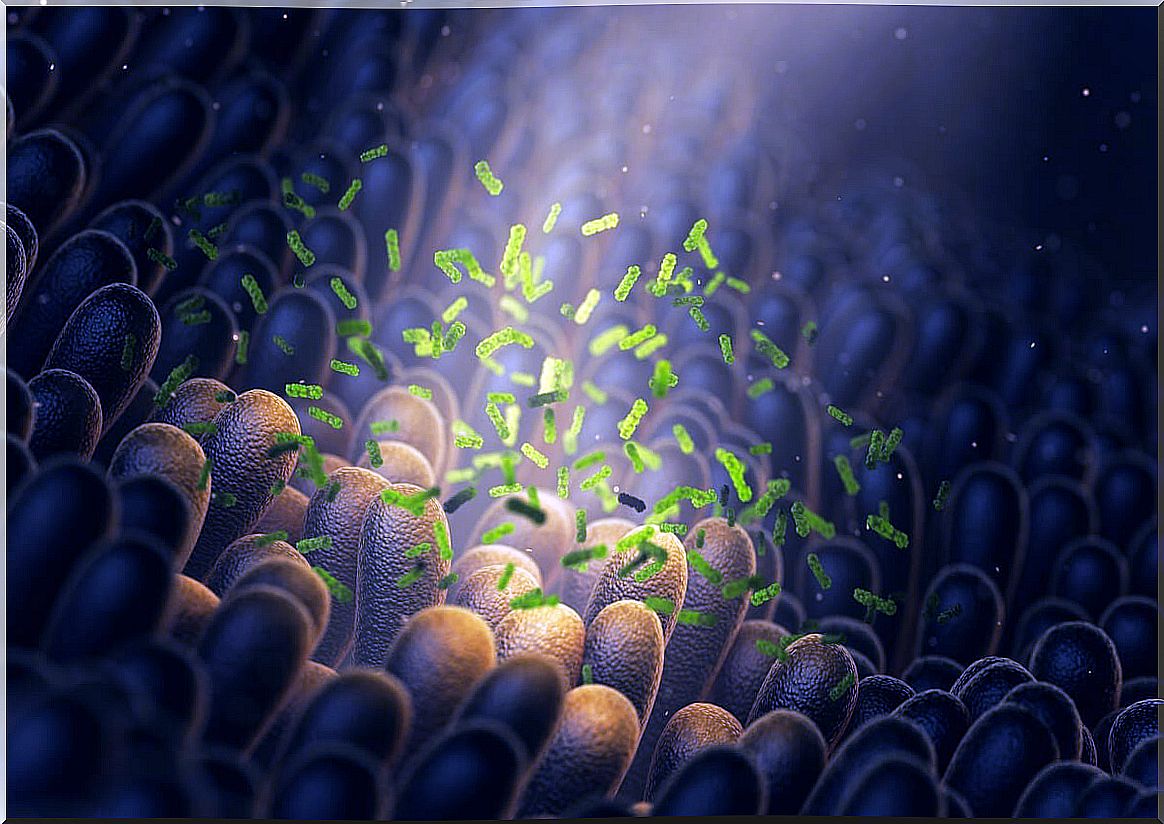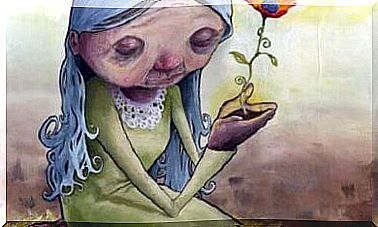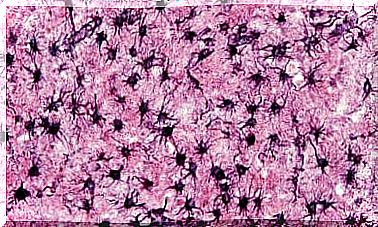Microbiota And Depression: How Are They Related?

Microbiota and depression are two concepts that belong to different semantic nodes and that a priori have nothing to do with each other. However, they are related, and apparently far more so than scientists thought just a few decades ago.
So far this century, a large number of research teams have devoted numerous resources to studying the digestive tract and how it influences other organs. The results show a two-way communication between different systems, which means that what happens in one organ acts directly or indirectly in other organs.

What is the gut microbiota?
The intestinal microbiota, formerly known as the intestinal flora, is made up of a set of microorganisms that live in the intestine. It includes about one hundred trillion of these microorganisms, including more than 400 species of bacteria, various fungi, viruses, protozoa, and other microbes.
The gut microbiota have important roles in the physiology and pathophysiology of health and disease. Some of the most important are the following:
- Digestion and absorption of nutrients.
- Synthesis of vitamins K, B5, B8 (biotin) and B9 (folic acid).
- Intestinal absorption of iron, calcium and magnesium.
- Synthesis of short chain fatty acids (SCFA).
- Neuroendocrine regulation (gut-brain axis).
- Modulation of the immune system.
- Energy homeostasis.
- Barrier function against pathogens.
- Synthesis of neurotransmitters.
- Regulation of intestinal transit.
Why is the microbiota related to depression?
According to some studies, everything indicates that the communication between the microbiota and the brain is bidirectional. The nervous, endocrine and immune systems are involved in this communication.
The microorganisms present in the microbiota produce substances that can cross the intestinal epithelium, go into the blood, cross the blood-brain barrier and reach the brain. The reverse process also occurs: the nervous system acts on the intestinal bacteria and modulates them.
For example, today we know that 95% of serotonin, one of the most important neurotransmitters in regulating mood, is produced in the intestine. Other important agents in gut-brain communication are short-chain fatty acids —acetate, propionate, and butyrate—, hormones such as cortisol, or neurotransmitters such as GABA.
Altered microbiota and depression
The balance of the microbiota can be affected by multiple factors : diet, antibiotics, chronic stress, sedentary lifestyle or lack of continuous rest are some of the most important.
Thus, when the composition of the microbiota is altered and an imbalance occurs – known as intestinal dysbiosis – this can contribute to the appearance or worsening of the symptoms of depression.
As we have explained in the previous section, the reverse process also happens: a depressive state can modify certain species of bacteria in the microbiota. And, in turn, the altered microbiota worsens the depressive picture.
How can we improve the state of the microbiota?
Human beings cannot control many of the external negative factors that happen to us : crises, pandemics, accidents or deaths. These are situations that can become very harmful and that can predispose us to suffer depression.
However, we have great power to act in what happens within us, both physically and mentally. Therefore, and given the knowledge we have today, it is key that we take care of the factors that most influence the balance of the microbiota.
Diet
A diet based on real foods and not products is essential to maintain a good intestinal balance. The foods that are most recommended to consume for a low-inflammatory diet are vegetables, fruits, nuts and seeds, fish, eggs, and unprocessed grass-fed meat.
On the contrary, ultra-processed foods, alcoholic and sugary drinks can cause inflammation in the intestine. A low-grade inflammation sustained over time favors the development of multiple diseases, mostly preventable. For that reason, it is important that we eat the least processed diet possible.
Antibiotics and probiotics
The consumption of antibiotics destroys the balance of intestinal bacteria. For this reason, more and more probiotics are being prescribed when an antibiotic is prescribed. However, these do not always comply with what is described on the labels. A good way to know if a probiotic is quality or not is to see if the product description includes the following:
- Identification of genus and species of microorganisms.
- Strain designation.
- Storage conditions.
- Security.
- Recommended dose.
- Exact description of the physiological effect.
Chronic stress
Chronic stress is one of the factors that most influence people’s psychological discomfort. In addition, it significantly alters the balance of the microbiota.
Because of this, it is important that we look for ways to better manage stress. Some of the most effective ways are to practice mindfulness, meditation, take walks in the forest or any physical activity that allows us to get away from our most harmful thoughts.
Physical activity
Performed constantly, physical exercise increases the diversity of the intestinal microbiota. In addition to its myriad physical benefits, physical activity prevents diseases such as colorectal cancer, obesity, anxiety, and depression.
Physical activity especially benefits people who suffer from depressive states, stress and anxiety. Not only does it improve mood, but the microbiota is indirectly favored.

Insomnia
A bad continuous rest in time alters many of the functions of the organism, among them, the digestive function. Thus, when we sleep badly it is usual that we digest dinner worse.
The gut microbiota is also impaired by long-term poor quality sleep. In case of going through a time when we suffer from insomnia, it is important that we find a way to solve it.
Final thoughts on microbiota and depression
Every day there is more research that associates the balance of the intestinal microbiota with mood. We cannot always decide the experiences that we are going to live, but we can have a proactive attitude towards everything that we can control.
Taking care of the intestinal microbiota favors a correct functioning of the nervous system, since it regulates neurotransmitters as important in depression as serotonin.
In addition, a healthy microbiota contributes to the balance of other systems so basic to our well-being such as the immune or endocrine system, which will benefit our general health.









